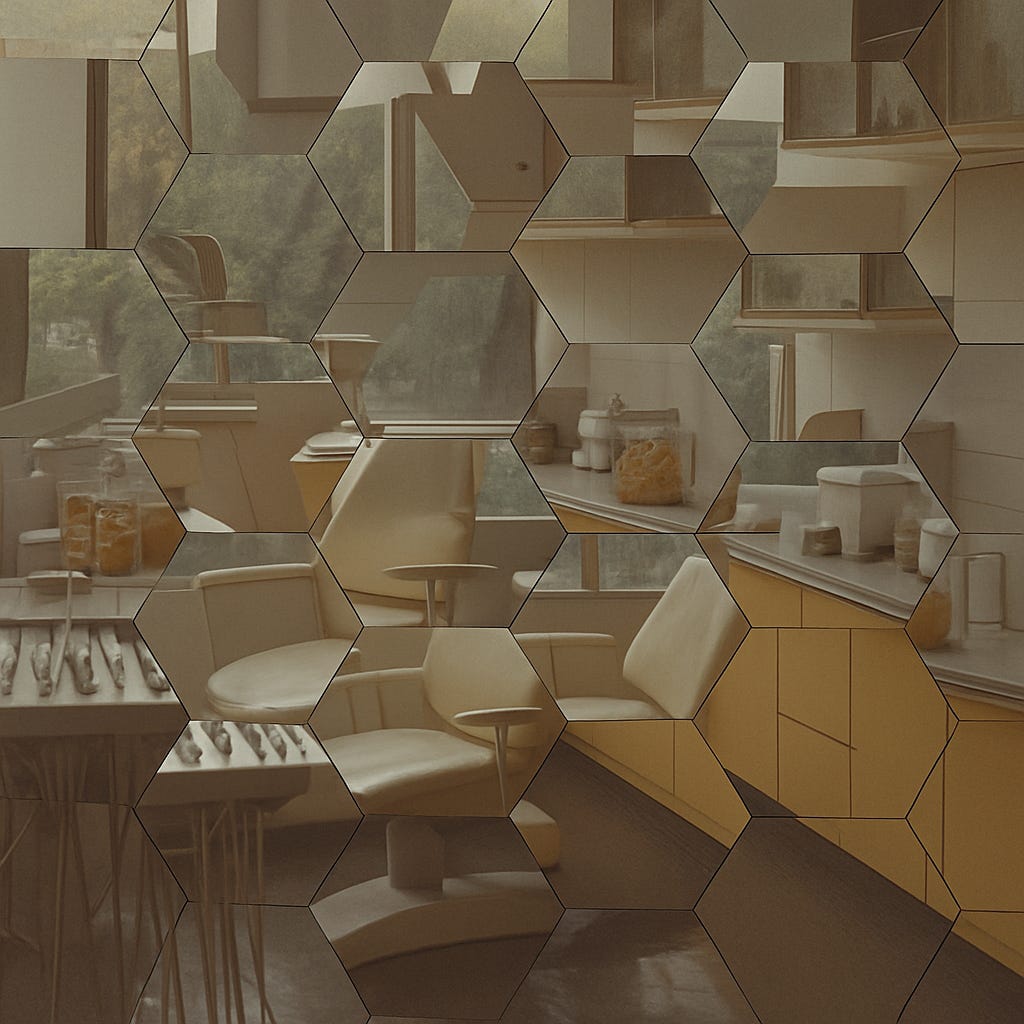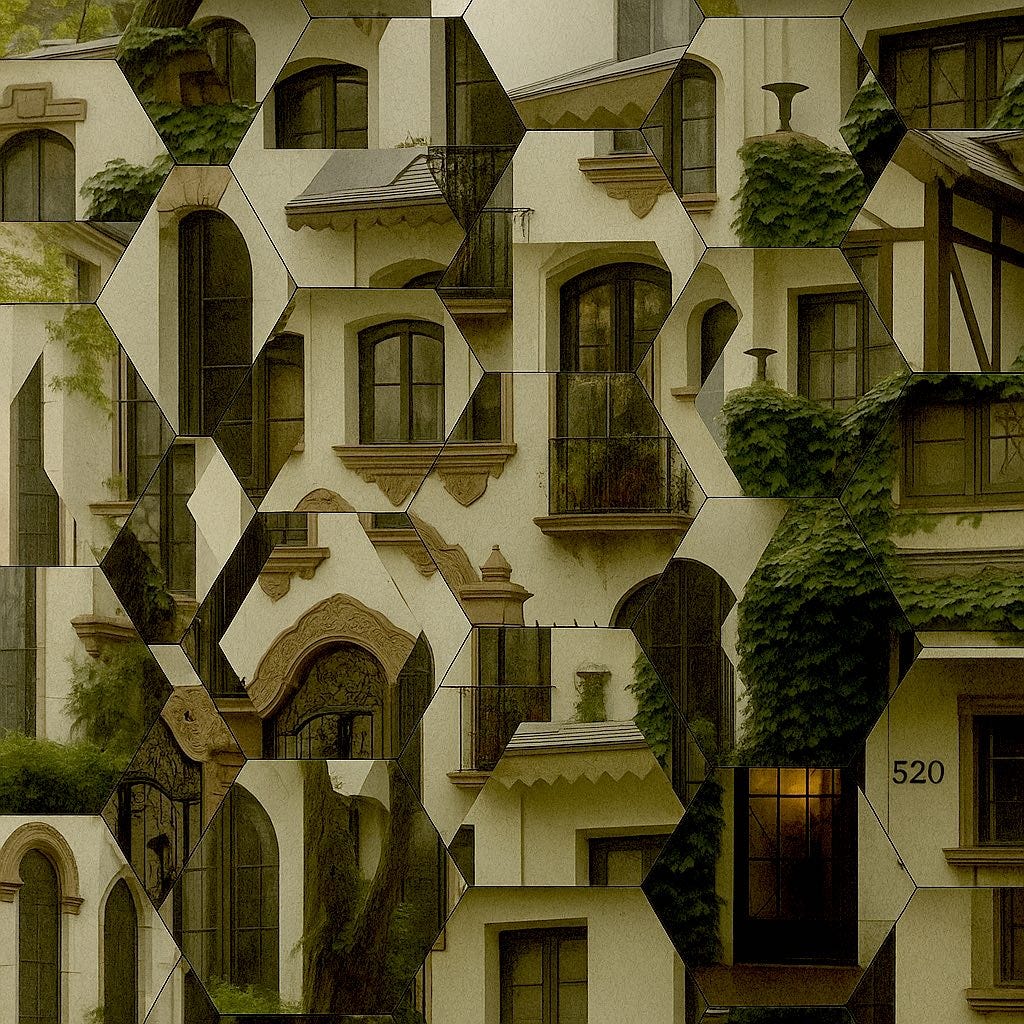I. Miguel Ángel de Quevedo
Llegar al dentista a los siete años. Esperar en una sala con el estómago llorando entre las manos. Afuera, una tormenta violenta sacude el mundo.
Las paredes de la sala de espera están decoradas con pinturas desagradables, casi hostiles.
Adentro, el doctor Géricault nos recibe en un consultorio con ventanas enormes. No podemos escuchar bien lo que dice: el granizo golpea los ventanales con furia. Nos inyecta anestesia dentro de la boca con una aguja punzante. Luego, el taladro dental ruge, mecánico y sin compasión. El olor a metal quemado se mezcla con el chorro de agua que como un pequeño tsunami inunda la boca. Nos informa que debe hacer un molde de nuestros dientes y nos introduce una pasta rosa del tamaño de una balsa.
Se va.
Quedarse esperando una eternidad sin poder decir palabra. Observar las gotas deslizarse por el vidrio. Las lágrimas que recorren nuestras mejillas parecen parte del clima. La pasta rosa tiene un cruel sabor dulzón, plástico. La tormenta y el tormento son hermanos.
El doctor Géricault regresa. Extrae la balsa, que ahora es una piedra. Sentirse liberado, pero incapaz de hablar. Sentir que nuestra boca ya no nos pertenece. Al salir, una sensación total de libertad y alegría nos invade. Cruzar la calle para premiarnos con una bolsa de galletas de animalito.
Ninguno de esos animales tiene boca. Ni dientes.
Hay una moraleja en esa zoología muda.
I.
Arriving at the dentist at the age of seven. Waiting in a room with our stomach crying in our hands. Outside, a violent storm shakes the world.
The walls are decorated with unpleasant, almost hostile paintings.
Inside, Dr. Géricault receives us in a clinic with enormous windows. Not quite hearing what he’s saying—the hail is hammering the glass too loudly. He injects anesthesia inside our mouth with a sharp needle. Then the dental drill roars, mechanical and merciless. The smell of burnt metal mixes with the whirling stream of water flooding our mouth. He informs us that he must take a mold of our teeth and stuffs a pink paste into our mouth the size of a raft.
He leaves.
Waiting for an eternity, unable to say a word. To watch the drops of water slide down the glass. The tears running down our cheeks feel like part of the weather. The pink paste has a cruel, sweetish, plastic taste. The storm and the torment are siblings.
Doctor Géricault returns. He removes the pink raft, now turned to stone. To feel liberated, but unable to speak. To feel that our mouth no longer belongs to us. To feel, as we leave, a sense of complete freedom and overwhelming joy. Crossing the street to reward ourselves with a bag of animal crackers.
None of the animals have mouths. Or teeth.
There is a moral in that mute zoology.
II. Campos Elíseos
Cada tarde, exactamente a las seis y veintitrés, con enredaderas violetas trepando por las paredes, uno debe entrar en una sala oscura.
Dentro, habrá muebles anticuados y de mal gusto, cubiertos de plástico crujiente.
Te sientas conmigo, tu amigo, en silencio, bajo el zumbido constante de una luz fluorescente, mientras el olor a un guiso misterioso llega desde la cocina.
Figuras de porcelana —souvenirs polvorientos de unas vacaciones lejanas— observan desde los estantes, únicos testigos de tiempos mejores.
La casa, incómoda y barroca, parece hecha a propósito para una conversación sentimental.
Los árboles grises del exterior protegen las palabras, suavizan y amplifican las pausas.
El reloj da cuerda sin que la luz cambie jamás. Y de repente, llega la noche con la lluvia.
La humedad se mezcla con un bolero lejano y el aroma de un horno de leña.
Una fuente de vino puede estar burbujeando en el patio contiguo, cerca de una casa derruida y de la ventana iluminada del baño rosa del vecino de enfrente. Deberíamos permanecer allí, en la embriaguez permanente, hablando de mundos hipotéticos y casi inalcanzables, bajo la lápida de cemento de la anticipación.
II.
Every afternoon, exactly at six twenty-three, with violet vines climbing up the walls, one must enter a dark living room.
Inside, there will be outdated, tasteless pieces of furniture, covered in crackling plastic.
You sit with me, your friend, in silence, beneath the constant hum of a fluorescent light, while the smell of a mysterious stew drifts in from the kitchen.
Porcelain figurines—dusty souvenirs from a long-ago vacation—watch from the shelves, the only witnesses to better times.
The house, uncomfortable and baroque, seems purposely made for a sentimental conversation.
The gray trees outside protect the words, soften and amplify the pauses.
The clock winds down without the light ever changing. And suddenly, night arrives with the rain.
Humidity mingles with a distant bolero, and the hint of a wood oven.
A fountain of wine may be bubbling in the adjoining courtyard, near a crumbling house and the lit window of the neighbor’s pink bathroom across the way.
We ought to remain there, in the permanent inebriation, speaking of hypothetical and nearly unattainable worlds,
beneath the cement tombstone of anticipation.
III. Félix Cuevas
Llego tarde al velorio. Es en el mismo recinto de siempre, un lugar detenido en el tiempo, donde hemos despedido a generaciones, como si la muerte tuviera una dirección fija.
Las gardenias, persistentes, perfuman el aire denso. El piso de loseta vinílica brilla bajo el pulso agudo del olor a Ajax. La alfombra azul marino, envejecida y deshilachada por incontables pasos, amortigua el eco de los murmullos. Los empleados, imperturbables, visten el negro como un hábito ancestral. Todo está dispuesto con la exactitud de una liturgia que se repite con precisión ritual entre tragedia y burocracia.
Pero no es la muerte lo que me perturba, sino la ansiedad del reencuentro: tras casi dos décadas, volver a ver a tantos parientes con quienes no tengo nada que ver. Las coronas fúnebres se confunden con el cuero agrietado de los sillones. El almizcle dulce de las tías mayores se entrelaza con la brasa persistente de los puros de los tíos.
No hay llanto. Hay bullicio, brindis velados, risas contenidas. No porque la ausencia no duela, sino porque la noche ya ha avanzado demasiado, y el nombre del muerto apenas flota, diluido, entre las copas.
En un rincón, un hombre de suéter gastado observa en silencio. Tiene unos sesenta años. Nadie sabe quién es. Me intriga. Lo imagino como un devoto de los duelos ajenos, un coleccionista de funerales que, al asistirlos, encuentra un propósito secreto, un mapa invisible que lo guía entre vidas que no fueron suyas.
Sin razón aparente, mi mente se desvía hacia un restaurante cerrado cerca de casa. Hace meses que no sirve comidas, pero las luces aún permanecen encendidas, y las mesas —como esperando una última cena— siguen dispuestas. Imagino entrar, sentarme, pedir el Wiener schnitzel de cada viernes, exigir el mismo servicio impecable. Lo absurdo es creer que alguien aún vendrá a tomar la orden.
Finalmente cruzo el umbral del salón principal, donde se encuentra el féretro y los familiares cercanos.
Y entonces lo entiendo.
Todos los presentes están muertos— personas a cuyos velorios yo asistí personalmente a lo largo de mi vida. Todos esos rostros familiares que creía desvanecidos, están aquí. Pero no se sorprenden al verme. Me saludan con la naturalidad de quien ve a un primo volver del mandado. No puedo hablar, pero ellos sí. Me nombran, me recuerdan. Comprendo finalmente donde estoy.
Y comprendo lo inefable: no hemos venido a velar a un muerto. Hemos venido a celebrar un nacimiento. Alguien —un pariente— ha cruzado hacia el mundo de los vivos.
III.
I arrive late to the wake. It’s in the same place as always, a room suspended in time, where we’ve said goodbye to generations—as if death had a fixed address.
The gardenias, persistent, perfume the heavy air. The vinyl tile floor gleams under the sharp pulse of Ajax. The navy blue carpet, aged and frayed by countless footsteps, muffles the echo of murmurs. The staff, imperturbable, wear black as if it were an ancestral habit. Everything is arranged with the precision of a liturgy that repeats itself in ritual accuracy—somewhere between tragedy and bureaucracy.
But it’s not death that unsettles me—it’s the anxiety of reunion: after almost two decades, seeing so many relatives again with whom I share little beyond blood. The funeral wreaths blur into the cracked leather of the armchairs. The sugary musk of elderly aunts mingles with the stubborn ember of uncles' cigars.
There are no tears. There’s a quiet bustle, discreet toasts, restrained laughter. Not because the absence isn’t felt, but because the night has advanced too far, and the name of the deceased now floats faintly, diluted among the glasses.
In a corner, a man in a worn-out sweater watches in silence. He’s about sixty. No one knows who he is. He intrigues me. I imagine him as a mourner of strangers, a collector of funerals who finds, in attending them, a secret purpose—a hidden map guiding him through lives that were never his.
Without warning, my mind drifts to a closed-down restaurant near my home. It stopped serving meals months ago, but the lights are still on, and the tables—like waiting for a final supper—remain perfectly set. I imagine walking in, taking a seat, ordering the same Wiener schnitzel I used to every Friday, demanding the impeccable service of old times. The absurd thing is believing someone might still come to take the order.
Finally, I cross the threshold into the main hall, where the casket and closest relatives are gathered.
And then I understand.
Everyone present is dead—people whose funerals I personally attended throughout my life. All those familiar faces I thought had vanished are here. But they’re not surprised to see me. They greet me with the ease of someone seeing a cousin return from a quick errand. I can’t speak, but they can. They say my name. They remember me. And I finally understand where I am.
And I grasp the ineffable: we haven’t come to mourn a death. We’ve come to celebrate a birth.
Someone—a relative—has just crossed over into the world of the living.






Beautiful